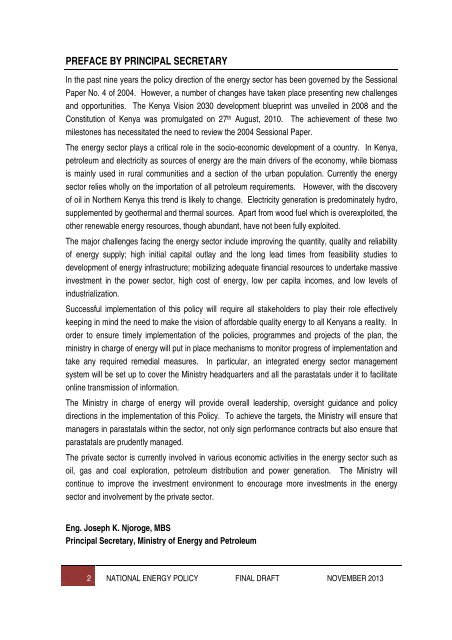National Energy Policy - Final Draft - 14 Nov 2013
National Energy Policy - Final Draft - 14 Nov 2013
National Energy Policy - Final Draft - 14 Nov 2013
You also want an ePaper? Increase the reach of your titles
YUMPU automatically turns print PDFs into web optimized ePapers that Google loves.
PREFACE BY PRINCIPAL SECRETARYIn the past nine years the policy direction of the energy sector has been governed by the SessionalPaper No. 4 of 2004. However, a number of changes have taken place presenting new challengesand opportunities. The Kenya Vision 2030 development blueprint was unveiled in 2008 and theConstitution of Kenya was promulgated on 27 th August, 2010. The achievement of these twomilestones has necessitated the need to review the 2004 Sessional Paper.The energy sector plays a critical role in the socio-economic development of a country. In Kenya,petroleum and electricity as sources of energy are the main drivers of the economy, while biomassis mainly used in rural communities and a section of the urban population. Currently the energysector relies wholly on the importation of all petroleum requirements. However, with the discoveryof oil in Northern Kenya this trend is likely to change. Electricity generation is predominately hydro,supplemented by geothermal and thermal sources. Apart from wood fuel which is overexploited, theother renewable energy resources, though abundant, have not been fully exploited.The major challenges facing the energy sector include improving the quantity, quality and reliabilityof energy supply; high initial capital outlay and the long lead times from feasibility studies todevelopment of energy infrastructure; mobilizing adequate financial resources to undertake massiveinvestment in the power sector, high cost of energy, low per capita incomes, and low levels ofindustrialization.Successful implementation of this policy will require all stakeholders to play their role effectivelykeeping in mind the need to make the vision of affordable quality energy to all Kenyans a reality. Inorder to ensure timely implementation of the policies, programmes and projects of the plan, theministry in charge of energy will put in place mechanisms to monitor progress of implementation andtake any required remedial measures. In particular, an integrated energy sector managementsystem will be set up to cover the Ministry headquarters and all the parastatals under it to facilitateonline transmission of information.The Ministry in charge of energy will provide overall leadership, oversight guidance and policydirections in the implementation of this <strong>Policy</strong>. To achieve the targets, the Ministry will ensure thatmanagers in parastatals within the sector, not only sign performance contracts but also ensure thatparastatals are prudently managed.The private sector is currently involved in various economic activities in the energy sector such asoil, gas and coal exploration, petroleum distribution and power generation. The Ministry willcontinue to improve the investment environment to encourage more investments in the energysector and involvement by the private sector.Eng. Joseph K. Njoroge, MBSPrincipal Secretary, Ministry of <strong>Energy</strong> and Petroleum2 NATIONAL ENERGY POLICY FINAL DRAFT NOVEMBER <strong>2013</strong>


